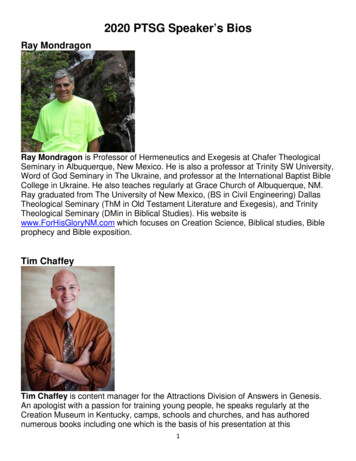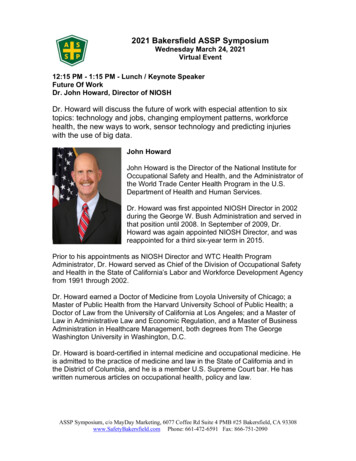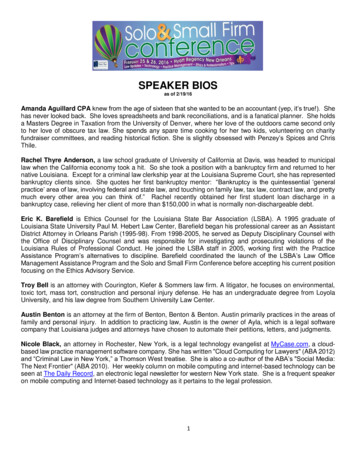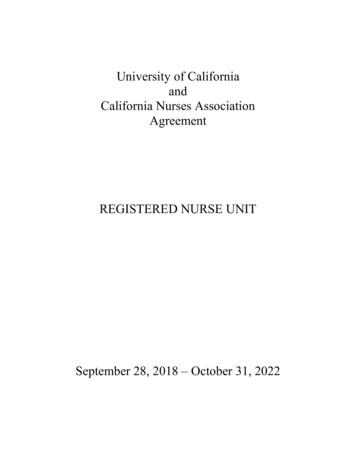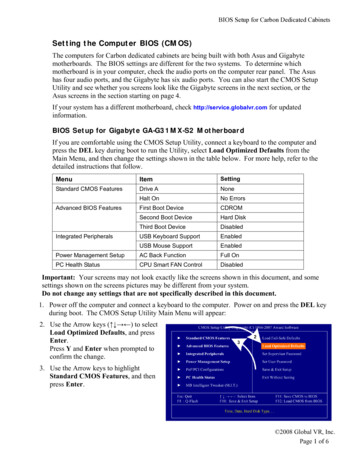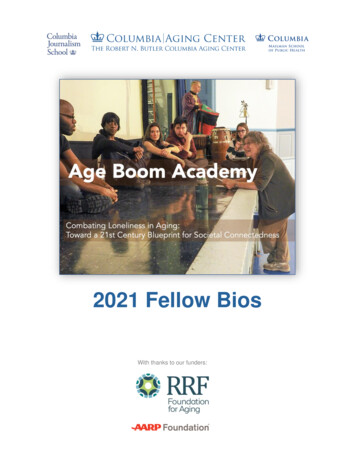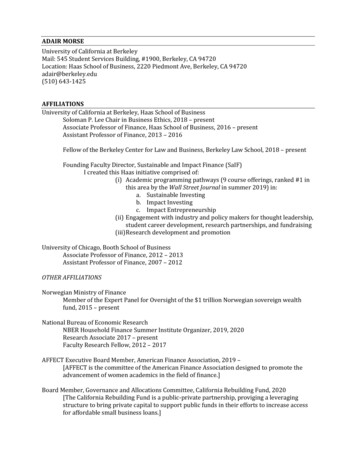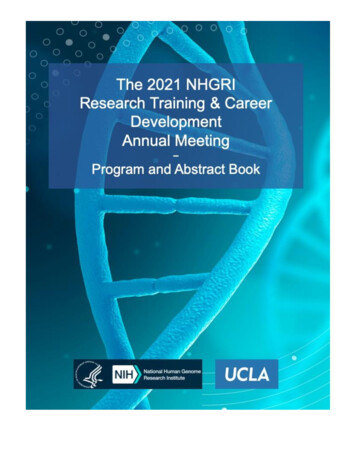
Transcription
Speaker BiosJD BartonClinical Psychology Fellow, UCLAJD Barton, PsyD is a clinical psychology fellow at UCLA Counseling andPsychological services and graduate from Pepperdine University. He completedhis predoctoral internship at UCLA CAPS. His research explores techniques forimplementing culturally-affirming practices within therapy and institutionalsettings and has developed expertise in trauma, and identity-affirming cognitivebehavioral theory. He has worked in a diverse number of settings includinguniversity counseling centers, hospitals, neuropsychology clinics, andcommunity mental health.Sarah BatesCommunications and Public Liaison Branch, NHGRISarah Bates is the chief of NHGRI’s Communications and Public Liaison Branch(CPLB). Previously, as a public affairs specialist for the National Science Foundation(NSF), Bates led communications for the Engineering Directorate and the BRAINInitiative, covering complex and sensitive topics such as gravitational waves, sexualharassment, and disaster relief. Through that work, she earned the NSF Director'sAward for Excellence Pioneer. Bates has a Master of Arts in Journalism, a Master ofScience in Astronomy, and a Bachelor of Arts in Physics and English.Jermaine BeanDoctoral Intern, UCLA Counseling and Psychological ServicesJermaine Bean is a Ph.D. candidate at Rosalind Franklin University of Medicine andScience and is currently completing his doctoral internship at UCLA Counseling andPsychological Services (CAPS). He completed his masters degree in sport psychologyat Southern Illinois University Edwardsville. His dissertation research explores racialstereotypes in athletics, more specifically, stereotypes related to intellect vs.athleticism at the quarterback position. Before joining the UCLA CAPS team, heworked in various settings, including academic medical centers, VA hospitals,community mental health centers, and university counseling centers.
Ewan BirneyDeputy Director General of EMBL, Director of EMBL-EBI and Senior Scientist,EMBL-EBIEwan Birney is Deputy Director General of EMBL. He is also Director of EMBLEBI with Dr. Rolf Apweiler, and runs a small research group. Ewan completedhis PhD at the Wellcome Sanger Institute with Richard Durbin. In 2000, hebecame Head of Nucleotide data at EMBL-EBI and in 2012 he took on the roleof Associate Director at the institute. He became Director of EMBL-EBI in 2015.In 2020, Ewan became the Deputy Director General of EMBL. In this role, heassists the EMBL Director General in relation to engagement with EMBL Member States and externalrepresentation. Ewan led the analysis of the Human Genome gene set, mouse and chicken genomes and theENCODE project, focusing on non-coding elements of the human genome. Ewan’s main areas of researchinclude functional genomics, DNA algorithms, statistical methods to analyse genomic information (in particularinformation associated with individual differences in humans and Medaka fish) and use of images for chromatinstructure. Ewan is a non-executive Director of Genomics England, and a consultant and advisor to a number ofcompanies, including Oxford Nanopore Technologies, Dovetail Genomics and GSK. Ewan was elected anEMBO member in 2012, a Fellow of the Royal Society in 2014 and a Fellow of the Academy of Medical Sciencesin 2015. In 2019, Ewan became a Board Member of the Biotechnology and Biological Sciences Research Council(BBSRC). He has received a number of awards including the 2003 Francis Crick Award from the Royal Society,the 2005 Overton Prize from the International Society for Computational Biology and the 2005 Benjamin FranklinAward for contributions in Open Source Bioinformatics.Michael BoehnkeRichard G. Cornell Distinguished University Professor of Biostatistics and Directorof the Center for Statistical Genetics and Genome Science Training Program at theUniversity of Michigan.Michael Boehnke is the Richard G. Cornell Distinguished University Professor ofBiostatistics at the University of Michigan. He is Director of the University of MichiganCenter for Statistical Genetics and Genome Science Training Program, a memberof the National Academy of Medicine, and a Fellow of the American StatisticalAssociation and of the American Association for the Advancement of Science. Dr.Boehnke did his undergraduate degree in Mathematics at the University of Oregonand his PhD in Biomathematics at UCLA. He has been on the faculty at Michigansince 1984. Dr. Boehnke develops statistical methods for the analysis of genetic dataand applies those methods to understand the genetic basis of human health anddisease, notably type 2 diabetes and related traits. Dr. Boehnke has supervised 23doctoral students 12 post-doctoral fellows.
Vence BonhamSenior Advisor to the NHGRI Director on Genomics and Health Disparities,NHGRIVence Bonham received his BA from Michigan State University and his JurisDoctor degree from the Moritz College of Law at Ohio State University. Mr.Bonham was a tenured faculty member at Michigan State University withappointments in the Colleges of Medicine and Law. He is currently anassociate investigator in the National Human Genome Research Institute(NHGRI) within the Division of Intramural Research's Social and BehavioralResearch Branch. He leads the Health Disparities Unit, which investigates theequitable integration of new genomic knowledge and precision medicine intoclinical settings. His research focuses primarily on the social implications ofnew genomic knowledge, particularly in communities of color, how genomics influences the use of the constructsof race and ethnicity in biomedical research and clinical care, and the role of genomics in health inequities. TheBonham group also studies sickle cell disease, a condition that will be impacted by emerging curative genomictechnologies but faces significant health disparities both in the United States and globally. Mr. Bonham alsoserves as the senior advisor to the NHGRI Director on Genomics and Health Disparities. This role complementshis research, as it allows contemporary genomic science and policy issues to inform his research program.Joy BoyerProgram Director, Division of Genomics and Society, NHGRIJoy Boyer has been a program official with the National Human GenomeResearch Institute (NHGRI) Ethical, Legal and Social Implications (ELSI)Research Program since 1996. As a program director in the NHGRI Division ofGenomics and Society, Joy oversees a portfolio of research, training and careerdevelopment grants related to the ethical, legal and social implications ofgenomic research. She coordinates the Centers of Excellence in ELSI Research(CEER) consortium and is the principal contact for ELSI Training grants (T32)program. She also participates in a variety of ELSI-related trans-NHGRI, transNIH and trans-HHS initiatives and programs, particularly initiatives focused onnewborn and prenatal genetic screening. Currently, Joy focuses on ELSI Research Program grants andinitiatives related to Genomics and Sociocultural Structures and Values. These projects examine the foundationalconcepts and values that underlie and shape how individuals, families, communities and other social and culturalgroups understand and use genomic information and technologies.Angela BrooksAssistant Professor of Biomolecular Engineering at the University ofCalifornia, Santa CruzAngela Brooks is an Assistant Professor of Biomolecular Engineering at theUniversity of California, Santa Cruz. She is also an Affiliated Faculty of theUCSC Center for Molecular Biology of RNA and the Director of Diversity forthe UCSC Genomics Institute. Angela joined UC Santa Cruz in 2015, aftercompleting her Postdoctoral Fellowship at the Dana-Farber CancerInstitute/Broad Institute with Matthew Meyerson. She completed her Ph.D. inMolecular and Cell Biology with a Designated Emphasis in Computationaland Genomic Biology in 2011 at UC Berkeley under the advisement ofSteven Brenner. In 2018, she was named a Pew Scholar in the Biomedical Sciences and was selected for theWomen in Science and Engineering Award as part of the UC Santa Cruz Chancellor’s Achievement Awards forDiversity. The Brooks lab works on developing computational and experimental approaches to study cancermutations that cause changes in the transcriptome, particularly through RNA splicing.
Carol BultProfessor and Knowlton Family Chair, The Jackson LaboratoryPrior to joining the Laboratory in 1997, Dr. Bult was a founding faculty member ofThe Institute for Genomic Research (TIGR) where she helped to pioneer theapplication of large-scale genomics to human gene discovery and whole genomesequencing. At The Jackson Laboratory, Dr. Bult and her collaborators maintain aunique database of genetic and genomic data for mouse models of human disease– a resource that is free to the entire scientific community. Her research groupcombines computational and experimental approaches to investigate the genetic andmolecular drivers of metastatic lung cancer and to identify causative mutations in thehuman birth defect, congenital diaphragmatic hernia. She has published more than150 scientific papers and serves on numerous national and international scientificadvisory boards. Current projects in the Bult lab include integrating diverse data from humans and mice to predictgenes that are causative for congenital diaphragmatic hernia, and exploring the relationship of microRNAs andtumor progression in lung cancer. Dr. Bult is the Director of the Diversity Action Plan (DAP) program at TheJackson Laboratory.Lisa ChadwickProgram Director Genome Sciences, Division of Genome Sciences, NHGRILisa Helbling Chadwick, Ph.D. joined the National Human Genome ResearchInstitute's Extramural Research Program as a program director in 2018. Sheoversees the Centers for Mendelian Genomics within the NHGRI GenomeSequencing Program. Prior to joining NHGRI, Dr. Chadwick was a programdirector in the Division of Extramural Research and Training at the NationalInstitute of Environmental Health Sciences (NIEHS), where she was involved inthe leadership of the NIH Roadmap Epigenomics Program, and the NIH 4DNucleome Program. Dr. Chadwick received a B.A. in biology from Case WesternReserve University, a Ph.D. in genetics from Case Western Reserve University, and completed postdoctoralresearch at NIEHS.Heather ColleyProgram Director, Division of Genomic Medicine, NHGRIMs. Colley is a program director in the Division of Genomic Medicine, NationalHuman Genome Research Institute (NHGRI), joining NHGRI in 2007. Herresearch portfolio includes the NHGRI Training and Career DevelopmentPrograms, NHGRI GWAS Catalog, and the NIH Common Fund UndiagnosedDiseases Network. Her research interests include increasing the diversity of thebiomedical workforce and leveraging genomics to improve human health. Ms.Colley received her M.S. in biomedical anthropology from the State University ofNew York at Binghamton.
Francis CollinsNIH Director, NIHFrancis S. Collins, M.D., Ph.D. was appointed the 16th Director of the NationalInstitutes of Health (NIH) by President Barack Obama and confirmed by theSenate. He was sworn in on August 17, 2009. In 2017, President Donald Trumpasked Dr. Collins to continue to serve as the NIH Director. President Joe Bidendid the same in 2021. Dr. Collins is the only Presidentially appointed NIHDirector to serve more than one administration. In this role, Dr. Collins overseesthe work of the largest supporter of biomedical research in the world, spanningthe spectrum from basic to clinical research. Dr. Collins is a physician-geneticistnoted for his landmark discoveries of disease genes and his leadership of theinternational Human Genome Project, which culminated in April 2003 with thecompletion of a finished sequence of the human DNA instruction book. Heserved as director of the National Human Genome Research Institute at NIHfrom 1993-2008. Dr. Collins is an elected member of both the National Academy of Medicine and the NationalAcademy of Sciences, was awarded the Presidential Medal of Freedom in November 2007, and received theNational Medal of Science in 2009. In 2020, he was elected as a Foreign Member of the Royal Society (UK) andwas also named the 50th winner of the Templeton Prize, which celebrates scientific and spiritual curiosity.Luis CubanoProgram Director, Division of Genomic Medicine, NHGRIDr. Luis Cubano is a program director in the Division of Genomic Medicine,National Human Genome Research Institute (NHGRI), joining NHGRI in 2019.His main responsibility is to lead NHGRI's Training and Career DevelopmentProgram. His interests include increasing the diversity of the biomedicalworkforce. Prior to joining NHGRI, Dr. Cubano was a professor and associatedean for research and graduate studies at the Universidad Central del CaribeSchool of Medicine in Puerto Rico. Dr. Cubano received his B.S. from TulaneUniversity, his M.S. from the University of Alabama in Huntsville, his Ph.D. fromKansas State University, and completed post-doctoral training at the TulaneUniversity Medical Center.Tina Del CarpioPhD candidate, Dept of Ecology and Evolutionary Biology at UCLATina is a Latinx, non-binary (pronouns: they/them) PhD candidate in Ecologyand Evolutionary Biology at UCLA. They are a member of the Lohmueller lab.Tina's research reflects their interests in both genetics and improving graduateeducation. They are estimating recombination rates in North American graywolf populations and breed dogs to investigate how domestication hasinfluenced the evolution of recombination rates. Tina is also studying theimpact of UCLA's Competitive Edge bridge program for new doctoral studentsfrom underrepresented minority (URM) backgrounds. They are hoping to learnthe strengths and areas of growth of the Competitive Edge program to improveURM student experiences and retention at UCLA. After completing their PhD,Tina plans to pursue a career working with STEM graduate programs to improve equity, diversity, and inclusion.Tina manages their mental health in grad school with help from their two emotional support cats Tuca and Jem.
Carla EasterSmithsonian’s National Museum of Natural HistoryCarla Easter, Ph.D., is the assistant director for Education, Outreach, and VisitorExperience at the Smithsonian's National Museum of Natural History. Formerly,she served as chief of the Education and Community Involvement Branch at theNational Human Genome Research Institute. Dr. Easter directed the outreachoffice for Washington University School of Medicine's Genome SequencingCenter and was a research associate in the Department of Education atWashington University where she explored the significance of science forsecondary students. She served as pre-college coordinator for the NASASummer High School Apprenticeship Research Plus Program and projectassociate for the Quality Education for Minorities Network. Dr. Easter conducted post-doctoral research atWashington University School of Medicine on the virulence factors associated with Streptococcus pyogenes.She earned her bachelor's degree in microbiology from the University of California, Los Angeles and herdoctorate in biology with an emphasis on molecular genetics from the University of California, San Diego.Elise FeingoldProgram Director Genome Analysis, Division of Genome Sciences, NHGRIDr. Elise A. Feingold is the Scientific Advisor for Strategic Implementation withinthe Division of Genome Sciences, National Human Genome Research Institute(NHGRI), at the U.S. National Institutes of Health. In this role, she providesstrategic support for scientific visioning and division-wide initiatives, andleadership for implementing the NHGRI 2020 Strategic Vision(https://www.genome.gov/2020SV). In addition, she serves as the Co-Managerof the Scientific Program Analysts program for NHGRI’s Extramural ResearchProgram. Previously, Dr. Feingold was a Program Director at NHGRI, managinga portfolio of research grants in Functional Genomics. In this position, sheinitiated and led the Encyclopedia of DNA Elements (ENCODE) Project (www.encodeproject.org) which iscreating a comprehensive catalog of functional elements in the human and mouse genomes as well as therelated model organism (modENCODE) project which focused on the comprehensive mapping of functionalelements in the D. melanogaster and C. elegans genomes. Dr. Feingold also managed, in collaboration with theNational Cancer Institute, the Mammalian Gene Collection project, which created a comprehensive collection ofsequence verified full-length human and mouse cDNA clones. Dr. Feingold received a B.A. in Biology with aconcentration in Genetics from the University of Pennsylvania and a Ph.D. in Human Genetics from YaleUniversity. After conducting post-doctoral research at the National Heart, Lung, and Blood Institute she joinedthe extramural division of NHGRI in 1992. Dr. Feingold received the 2013 HHS Secretary’s Award forDistinguished Service as well as NIH Director’s Awards in 1999, 2013 and 2015.
Faith FletcherAssistant Professor, Center for Medical Ethics and Health Policy, BaylorCollege of MedicineFaith E. Fletcher, PhD, MA is an Assistant Professor in the Center forMedical Ethics and Health Policy at Baylor College of Medicine. To date, herresearch has focused on implementing social and behavioral research incommunity and clinic settings, with attention to the ethics of engagingtraditionally marginalized and stigmatized populations in scientific research.She is currently co-chair of the American Society for Bioethics andHumanities RACE Affinity Group, a national special interest group committedto promoting bioethics discourse and cross-disciplinary collaboration aroundsocial and structural disadvantage. She is also a senior advisor to theHastings Center, a leading U.S. research institute in bioethics. Nationally,she is contributing to critical conversations around COVID-19 vaccinationequity, structural racism, medical mistrust, and trustworthiness. Her recentlyfunded NHGRI K01 study aims to employ stakeholder engagement methodswith rural populations in the Deep South to establish evidence-based frameworks and guidelines that reflect theirunique values, preferences, and priorities. This work aligns with her overall goal to promote ethical inclusion ofmedically underserved populations in scientific research to advance health equity.Steve FodorCo-founder of 13.8, Inc.Dr. Steve Fodor is currently co-founder of 13.8, Inc. He has founded andserved as chief executive officer/chief scientific officer of severalbiotechnology companies, most recently Cellular Research, Inc., acompany founded in 2011 to improve precision of measurements inbiology, Perlegen Sciences, Enumerix, and Atlas Bio. He is the founderand former chairman of Affymetrix, Inc., an innovative supplier of analysistools for genetics. Affymetrix began as a unit of the Affymax ResearchInstitute in Palo Alto, where Dr. Fodor spearheaded the effort to develophigh-density arrays of biological polymers in a light-directed, spatiallydefined format. Dr. Fodor and his colleagues were the first to describe anddevelop highly parallel microarray technologies utilizing combinatorialchemistry synthesis for measuring the genetics of an organism. His interests include developing innovativenew techniques to parallelize and digitize biological assays, increase precision in measurements, and toencourage and manage risk in entrepreneurial ventures. Dr. Fodor is a Fellow of the American Association forthe Advancement of Science (AAAS), a member of the American Chemical Society, the Biophysical Society,and the National Academy of Engineering. In 1992, he and his colleagues were honored by the AAAS with theNewcomb-Cleveland Award for an outstanding paper published in Science. He has received various honorsand awards, including the Washington State University Alumni Achievement Award, the Intellectual PropertyOwner’s Distinguished Inventor of the Year Award, the Chiron
Award for Excellence Pioneer. Bates has a Master of Arts in Journalism, a Master of Science in Astronomy, and a Bachelor of Arts in Physics and English. Jermaine Bean Doctoral Intern, UCLA Counseling and Psychological Services Jermaine Bean is a Ph.D.

